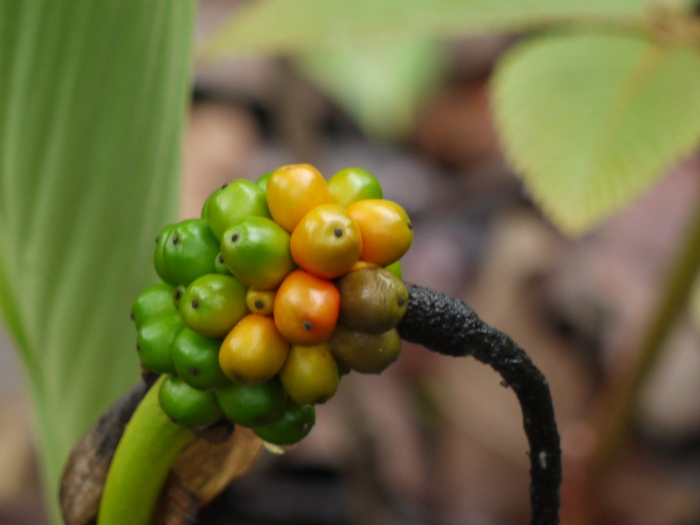Whipcord Cobra Lily
(Arisaema tortuosum)
Whipcord Cobra Lily (Arisaema tortuosum)
/
/

Dinesh Valke
CC BY-SA 2.0
Image By:
Dinesh Valke
Recorded By:
Copyright:
CC BY-SA 2.0
Copyright Notice:
Photo by: Dinesh Valke | License Type: CC BY-SA 2.0 | License URL: https://creativecommons.org/licenses/by-sa/2.0/ | Uploader: Dinesh Valke | Publisher: Flickr |





















Estimated Native Range
Summary
Arisaema tortuosum, commonly known as Whipcord Cobra Lily, is a deciduous perennial herb that thrives in the moist, shaded forest floors and slopes of the Himalayas and South Asia. It can reach up to 2 meters in height and forms large clumps. The Whipcord Cobra Lily is notable for its striking inflorescence, featuring a purple or green whip-like spadix that can be up to 30 cm long, extending from the mouth of its unique "jack-in-the-pulpit" flower. The flowers, which may be male or bisexual, are typically hidden beneath large, hooded, green leaves. After flowering, the plant produces clusters of berries that transition from green to a bright red as they ripen.
The Whipcord Cobra Lily is valued for its exotic and dramatic appearance, making it a conversation piece in shade gardens or woodland settings. It is used for ornamental purposes, particularly in areas that mimic its native understory habitat. Gardeners should provide it with partial to full shade, consistent moisture, and well-draining soil rich in organic matter. While it is generally low-maintenance, it may require protection from slugs and snails, which are attracted to its foliage. It is not commonly associated with serious diseases or pests. Due to its unique flowering structure, it can also be a point of interest in educational gardens or botanical collections.CC BY-SA 4.0
The Whipcord Cobra Lily is valued for its exotic and dramatic appearance, making it a conversation piece in shade gardens or woodland settings. It is used for ornamental purposes, particularly in areas that mimic its native understory habitat. Gardeners should provide it with partial to full shade, consistent moisture, and well-draining soil rich in organic matter. While it is generally low-maintenance, it may require protection from slugs and snails, which are attracted to its foliage. It is not commonly associated with serious diseases or pests. Due to its unique flowering structure, it can also be a point of interest in educational gardens or botanical collections.CC BY-SA 4.0
Plant Description
- Plant Type: Herb
- Height: 4-6 feet
- Width: 1-2 feet
- Growth Rate: Moderate
- Flower Color: Green, Purple
- Flowering Season: Spring, Summer
- Leaf Retention: Deciduous
Growth Requirements
- Sun: Full Sun, Part Shade
- Water: Medium
- Drainage: Slow, Medium
Common Uses
Low Maintenance, Potted Plant, Rock Garden
Natural Habitat
Moist, shaded forest floors and slopes of the Himalayas and South Asia
Other Names
Common Names: Arisaema
Scientific Names: , Arisaema tortuosum, Arisaema curvatum, Arum tortuosum,
GBIF Accepted Name: Arisaema tortuosum (Wall.) Schott